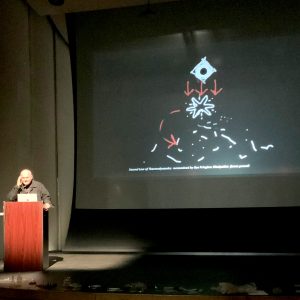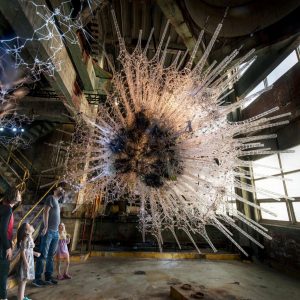 This is Bea’s writeup of Thursday night’s cool Philip Beesley lecture at Kresge Theater:
This is Bea’s writeup of Thursday night’s cool Philip Beesley lecture at Kresge Theater:
On January, 23, 2020, the CMU School of Architecture kicked-off the Spring Lecture series with a big name in the field of parametric, progressive and experiential architecture: Philip Beesley. The Canadian architect and “dilettante mathematician” – as he humbly puts it – is most famous for his sculptures and installations of “Near-Living Spaces” and for his collaborations with fashion designer, Iris Van Herpen.
His take on our profession is philosophical, even more than technical, as he investigates the boundaries of what we consider architecture.
Does architecture need walls? Does society? His take is poetic and even a bit political at the same time, although what we want to focus on here is his position on the current environmental state of the Earth and the “unspeakable shaking ground” we all sit on.
His take is provocative: In a world where sustainability and efficiency are so fundamental, do we really need to surround ourselves with physical and imaginary boundaries? He doesn’t think so. His installations explore entropy and the way people and places can merge in a “deliberate wilderness and dizziness”. If you have ever seen or been in one of his projects, you would have felt the dizziness for sure, but also the interconnection with the world. If we go past the “annihilation” and “imbalance” of the built environment and allow entropy to redefine our reality, we will finally reconnect with the world and maybe even live more sustainably. “Do not fight, do not build an armor,” he warns us. “Believe in interchange”.

By imparting precarity in his work, Philip Beesley attempts to explore the “multiple-dispositions” and “pluripotency” of our world, by “building scaffolds to gather entropy”.
His research is a tentatively optimistic take on the future of our world. He hopes that his research will help reveal new solutions to old problems.
